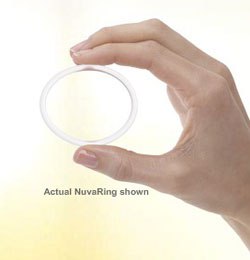9 Things We Learned From Vanity Fair’s Article About The Dangers Of NuvaRing
 In the January issue of Vanity Fair magazine, Marie Brenner looks into the potential dangers of newer hormonal birth control pills. By “newer” we mean “came on the market since the ’90s.” The popular NuvaRing, a convenient insertable ring, is associated with a higher risk of life-threatening cardiovascular problems. Why aren’t women warned about this when they begin taking it?
In the January issue of Vanity Fair magazine, Marie Brenner looks into the potential dangers of newer hormonal birth control pills. By “newer” we mean “came on the market since the ’90s.” The popular NuvaRing, a convenient insertable ring, is associated with a higher risk of life-threatening cardiovascular problems. Why aren’t women warned about this when they begin taking it?
You should go read the full article yourself, which introduces readers to the family of one young woman who died, an Olympic athlete who nearly died, and a lawyer working on behalf of affected patients…or their survivors.
- NuvaRing was developed in the ’90s by Organon, a Dutch drug company. It hit the U.S. market in 2002. Schering-Plough bought Organon in 2007, and Merck in turn acquired Schering-Plough in 2009.
- Study results vary, but the Food and Drug Administration says that women using contraceptive rings are 56% more likely than women using a different hormonal contraceptive to suffer a venous thromboembolism (VTE), a life-threatening blood clot. A study in the British Medical Journal found that women using rings were 90% more likely to have a VTE than women using other forms of birth control.
- This significant increased risk doesn’t really come up during the office visit when women get a prescription for NuvaRing or a free sample. Vanity Fair’s reporter sent two young women out to a college clinic and to Planned Parenthood to seek rings. Neither health care provider mentioned the increased VTE risk. The relative risk is low, but women still should know about the symptoms.
- The real danger of delivery systems like patches and pills is that they may deliver hormone spikes. Organon found evidence of this in its initial studies before launching NuvaRing.
- The article takes us to visit a New York law firm that’s working on multi-state litigation against drug companies over VTEs caused by third- and fourth-generation birth control. The attorney leading the charge against Merck learned something important from his work, and called his daughters with a succinct warning. “Do not ever use any third- or fourth-generation birth control,” he tells Vanity Fair that he told them. “It could kill you.”
- According to internal e-mails, Schering-Plough drug reps were instructed to minimize the risks of NuvaRing compared to other birth control when discussing the product with doctors. Marketing provided them with handy scripts to steer the conversation and compare the product favorably to competitors like the Ortho-Evra patch.
- You might remember Vioxx, a painkiller that increased patients’ risk of having a heart attack. Know who made that? Merck. When they were sued, the company refused to settle. In some cases, patients got big payouts, but in most, the company won.
- When the Ortho-Evra patch added a great big warning to its package about the increased danger of VTEs, sales plummeted 80%.
- One tiny early trial of NuvaRing showed huge, dangerous spikes in test subjects’ estrogen levels. This trial wasn’t part of Organon’s original application to the FDA.
Danger in the Ring [Vanity Fair]
Want more consumer news? Visit our parent organization, Consumer Reports, for the latest on scams, recalls, and other consumer issues.

